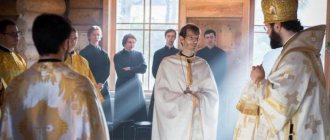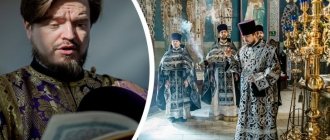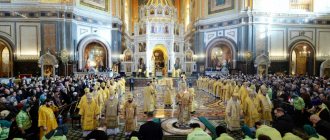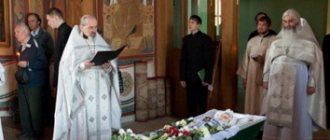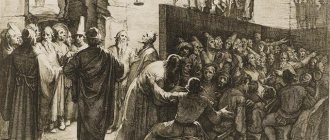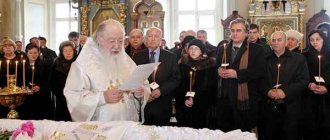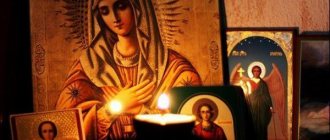Ask a question to the priest
Do you agree with this document and will you sign it? “APPLICATION OF THE TEMPORARY PATRIARIAL SYNOD By the grace of God, the humble Sergius, Metropolitan of Nizhny Novgorod, Deputy Patriarchal Locum Tenens, and the Temporary Patriarchal Holy Synod, - to your Eminence archpastors, God-loving shepherds, honest monks and all the faithful children of the holy All-Russian Orthodox Church, rejoice in the Lord. One of the concerns of our Holy Father Patriarch Tikhon before his death was to put our Orthodox Russian Church in the right relationship with the Soviet government and thereby give the church the opportunity for a completely legal and peaceful existence. Dying, His Holiness said: “I should live another three years.” And, of course, if his unexpected death had not stopped his saintly labors, he would have completed the job. Unfortunately, various circumstances, and mainly the speeches of foreign enemies of the Soviet state, among whom were not only ordinary believers of our church, but also their leaders, arousing the government’s natural and just mistrust of church leaders in general, interfered with the efforts of His Holiness, and he was not destined to see his efforts crowned with success during his lifetime. Now the lot to be the temporary deputy of the high priest of our church has again fallen on me, the unworthy Metropolitan Sergius, and along with the lot the duty has fallen on me to continue the work of the deceased and strive in every possible way for the peaceful arrangement of our church affairs. My efforts in this direction, shared with me and the Orthodox archpastors, do not seem to remain fruitless: with the establishment of a temporary patriarchal holy synod under me, the hope of bringing our entire church administration into proper order and order is strengthened, and confidence in the possibility of peaceful life and our activities within the limits of the law. Now that we are almost at the very goal of our aspirations, the actions of foreign enemies do not stop: murders, arson, raids, explosions and similar phenomena of underground struggle are before our eyes. All this disrupts the peaceful flow of life, creating an atmosphere of mutual mistrust and all sorts of suspicions. The more necessary for our church and the more obligatory for all of us who care about its interests, who want to lead it onto the path of legal and peaceful existence, the more obligatory for us now to show that we, church leaders, are not with the enemies of our Soviet state. va and not with the crazy instruments of their intrigues, but with our people and with our government. To testify to this is the first purpose of our present (mine and the Synodal) message. Then we inform you that in May of this year, at my invitation and with the permission of the authorities, a temporary patriarchal holy synod was organized under the deputy patriarch, consisting of the undersigned. Absent: Metropolitan Arseny of Novgorod, who has not yet arrived, and Archbishop Sebastian of Kostroma are absent due to illness. Our petition for permission for the synod to begin activities to govern the Orthodox All-Russian Church was crowned with success. Now our Orthodox Church in the Union has not only canonical, but also, according to civil laws, completely legal central government; and we hope that legalization will gradually spread to our lower church administration: diocesan, district, etc. It is hardly necessary to explain the meaning and all the consequences of the change that is taking place in this way in the position of our Orthodox Church, its clergy, all church leaders and institutions... Let us offer our prayers of thanksgiving to the Lord, who has been so well-disposed for our holy church! Let us publicly express our gratitude to the Soviet government for such attention to the spiritual needs of the Orthodox population, and at the same time we assure the government that we will not use the trust placed in us for harm. Having begun our synodal work with God’s blessing, we are clearly aware of the magnitude of the task ahead both for us and for all representatives of the church in general. We need to show, not in words, but in deeds, that faithful citizens of the Soviet Union, loyal to the Soviet government, can be not only people indifferent to Orthodoxy, not only traitors to it, but also its most zealous adherents, for whom it is dear as the truth and life, with all its dogmas and traditions, with all its canonical and liturgical structure. We want to be Orthodox and at the same time recognize the Soviet Union as our civil homeland, whose joys and successes are our joys and successes, and whose failures are our failures. Every blow, a blow directed at the Union, be it a war, a boycott, some kind of social disaster, or simply a murder from around the corner, like the one in Warsaw, is recognized by us as a blow aimed at us. Remaining Orthodox, we remember our duty to be citizens of the Union “not only out of fear, but also according to conscience,” as the Apostle teaches us (Rom. XIII, 5). And we hope that with God’s help, with your general assistance and support, this task will be resolved by us. The only thing that can hinder us is what also hindered the organization of church life on the basis of loyalty in the first years of Soviet power. This is an insufficient awareness of the seriousness of what happened in our country. The establishment of Soviet power seemed to many to be some kind of misunderstanding, accidental and therefore short-lived. People forgot that there are no accidents for a Christian and that in what happens in our country, as always and everywhere, the right hand of God is also at work, steadily leading every people to its intended goal. To such people, who do not want to understand the “signs of the times,” it may seem that it is impossible to break with the previous regime and even with the monarchy without breaking with Orthodoxy. This mood of certain church circles, expressed, of course, both in words and in deeds and arousing the suspicions of the Soviet government, also hampered the efforts of His Holiness the Patriarch to establish peaceful relations between the church and the Soviet government. It is not for nothing that the Apostle inspires us that we can “live quietly and serenely” according to our piety only by obeying the legal authority (I Tim. II, 2), or we must leave society. Only armchair dreamers can think that such a huge society as our Orthodox Church with all its organization can exist calmly in the state, closed off from power. Now, when our patriarchy, fulfilling the will of the deceased patriarch, decisively and irrevocably takes the path of loyalty, people of this mood will either have to break themselves and, leaving their political sympathies at home, bring only faith to the church and work with us only in the name of faith; or, if they cannot immediately change themselves, at least not interfere with us by temporarily withdrawing from the matter. We are confident that they will return to work with us again and very soon, making sure that only their attitude towards the authorities has changed, while their faith and Orthodox Christian life remain unshakable. In this situation, the question of the clergy who went abroad with the emigrants becomes especially acute. The blatant anti-Soviet speeches of some of our archpastors and shepherds, as is known, forced the late patriarch to abolish the synod abroad on April 22 (May 5, according to the current style) 1922. But the synod still continues to exist, without changing politically, but Recently, with his claims to power, he even split the foreign church society into two camps. To put an end to this, we demanded that the clergy abroad give a written pledge of complete loyalty to the Soviet government in all their public activities. Those who have not given such an obligation or who have violated it will be expelled from the clergy under the jurisdiction of the Moscow Patriarchate. We think that by demarcating ourselves in this way, we will be protected from any surprises from abroad. On the other hand, our resolution may make many people think whether it is time for them to reconsider the issue of their relationship to the Soviet government, so as not to break with their native church and homeland. We consider our no less important task to be the preparation for the convening and the very convening of our second local council, which will elect for us not a temporary, but a permanent central church government, and will also make a decision about all (thieves of power) of the church who are tearing apart Robe of Christ. The order and time of convening, the subjects of the cathedral’s activities, and other details will be worked out later. Now we will only express our firm conviction that our future council, having resolved many pressing issues of our internal church life, at the same time, with its conciliar mind and voice, will give final approval to the work we have undertaken to establish the correct relations of our church to the Soviet government. In conclusion, we earnestly ask all of you, your Eminence archpastors, pastors, brothers and sisters: help us each in your rank with your sympathy and assistance in our work, your zeal for the cause of God, your devotion and obedience to the Holy Church, especially yours for us Through prayers to the Lord, may he enable us to successfully and God-pleasingly complete the work entrusted to us for the glory of his holy name, for the benefit of our holy Orthodox Church and for our common salvation. The grace of our Lord Jesus Christ and the love of God and the Father and the communion of the Holy Spirit be with you all. Amen. July 16/29, 1927 Moscow. For the Patriarchal Locum Tenens Sergius, Metropolitan of Nizhny Novgorod. Members of the temporary Patriarchal Holy Synod: Seraphim, Metropolitan of Tver, Sylvester, Archbishop of Vologda, Alexy, Archbishop of Khutyn, administrator of the Novgorod diocese, Anatoly, Archbishop of Samara, Pavel, Archbishop of Vyatka, Philip, Archbishop of Zvenigorod, administrator. Moscow diocese, Konstantin, Archbishop of Sumy, manager. Kharkov diocese."
